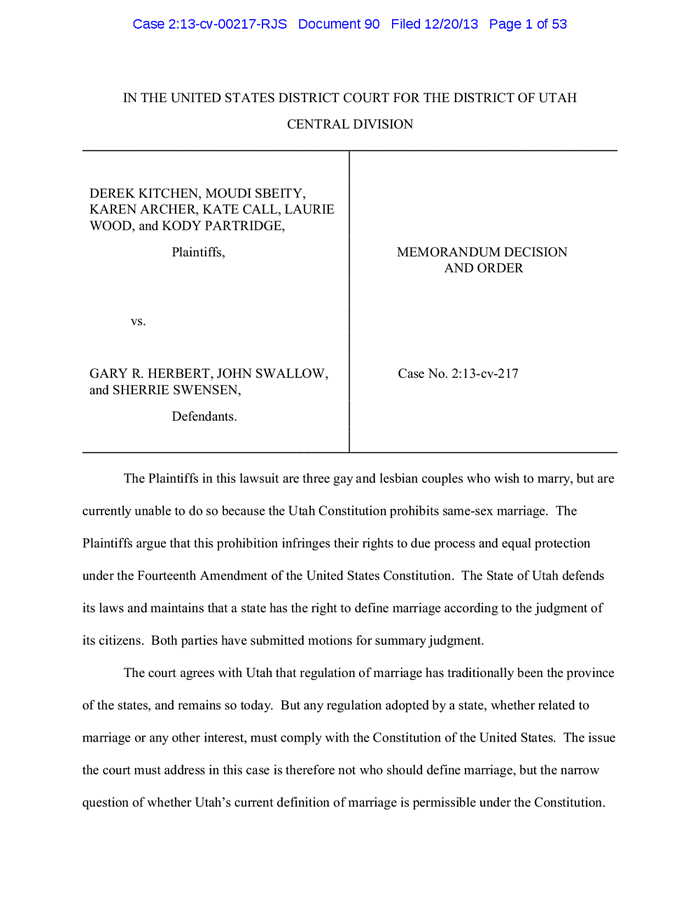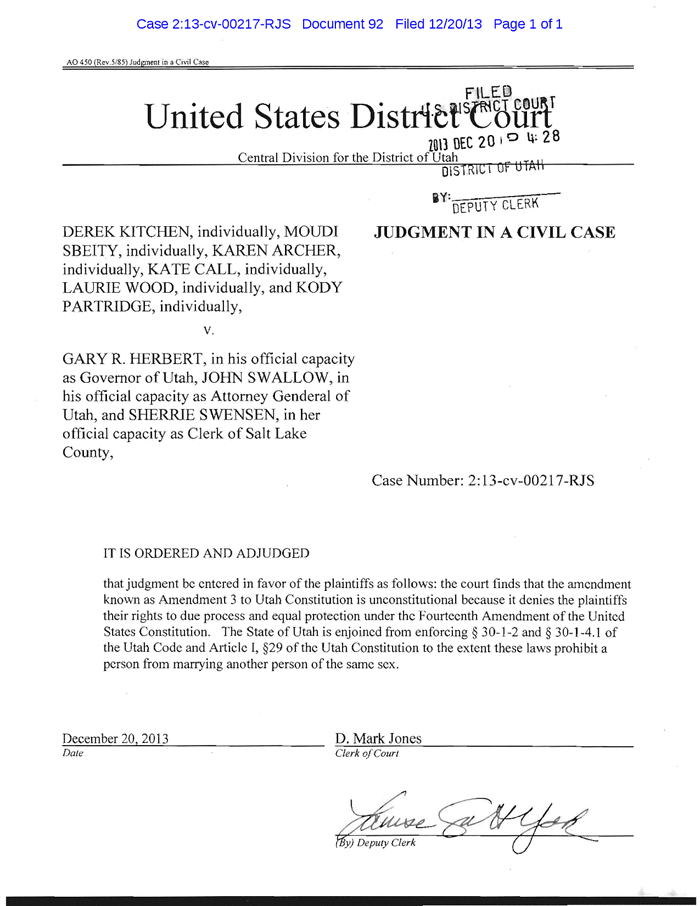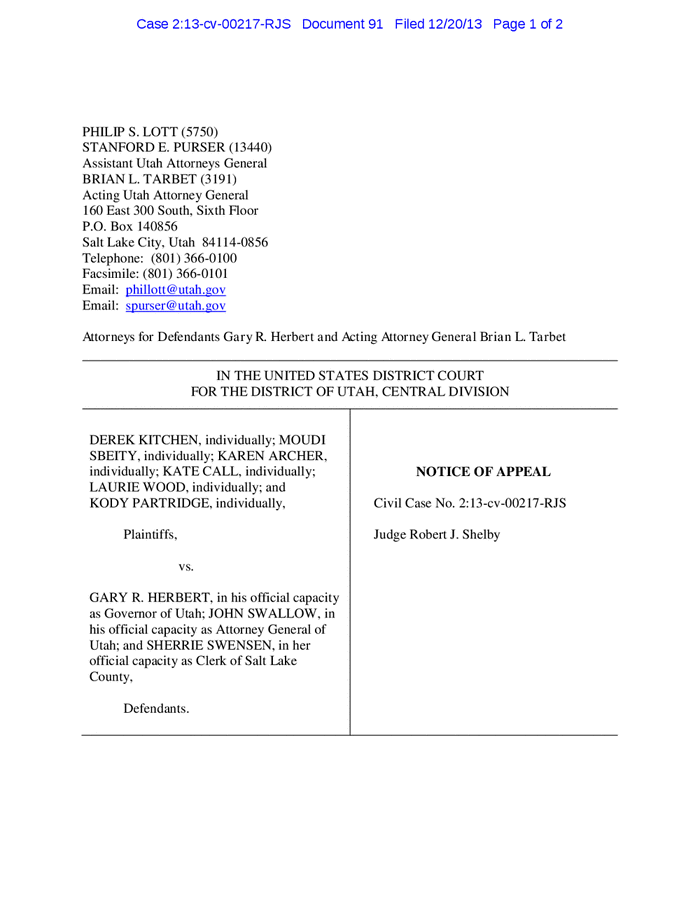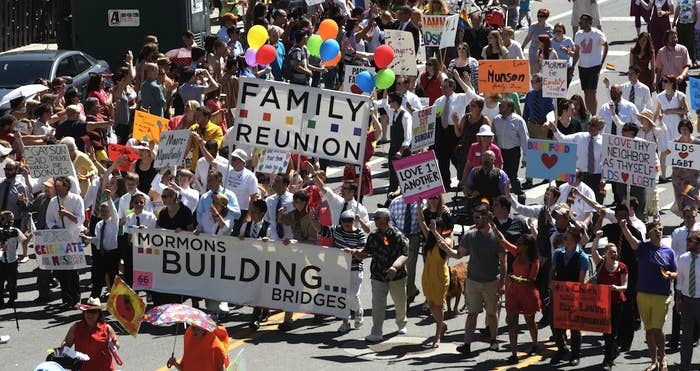
WASHINGTON — Utah's amendment banning same-sex couples from marrying is unconstitutional, a federal judge ruled Friday afternoon.
"The court hereby declares that Amendment 3 is unconstitutional because it denies the Plaintiffs their rights to due process and equal protection under the Fourteenth Amendment of the United States Constitution."
The ruling came a day after the Supreme Court of New Mexico interpreted its own state constitution as requiring that same-sex couples there be able to marry.
Although officials will be appealing the ruling, the Friday decision would make Utah the 18th state in the U.S. that allows same-sex couples to marry if it stands. An appeal would be heard by the 10th Circuit Court of Appeals.
"The federal district court's ruling that same-sex marriage is a fundamental right has never been established in any previous case in the 10th Circuit. The state is requesting an emergency stay pending the filing of an appeal," an official statement from the office of Acting Utah Attorney General Brian Tarbet noted. "The Attorney General's Office will continue reviewing the ruling in detail until an appeal is filed to support the constitutional amendment passed by the citizens of Utah."
A notice of appeal was filed by Utah officials with the trial court, prompting the court to transmit the trial court record to the 10th Circuit Court of Appeals.
Earlier, Utah Gov. Gary Herbert said in a statement, "I am very disappointed an activist federal judge is attempting to override the will of the people of Utah. I am working with my legal counsel and the acting Attorney General to determine the best course to defend traditional marriage within the borders of Utah."
With no stay issued immediately to keep the ruling from going into effect, however, the court's judgment in the case went into effect immediately when issued by the clerk at 4:28 p.m. local time. [Update at 3:40 a.m. Saturday, Dec. 21: State lawyers have now filed a request that the 10th Circuit immediately put same-sex couples' marriages on hold.]
And, couples in Salt Lake City did get married on Friday.
According to KSL-TV, "District Attorney Sim Gill said that he has advised clerks to proceed with the marriages, saying 'As of right now, if somebody gets in line and applies, there is no prohibition against it as a matter of law.'"
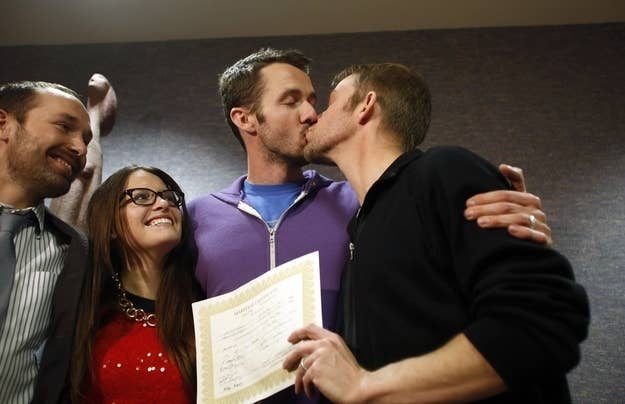
In deciding the case, Judge Robert J. Shelby noted that "any regulation adopted by a state, whether related to marriage or any other interest, must comply with the Constitution of the United States."
Shelby was appointed to the bench in 2011 by President Obama. He was confirmed by the Senate in September 2012.
In summary, he found:
Applying the law as it is required to do, the court holds that Utah's prohibition on same- sex marriage conflicts with the United States Constitution's guarantees of equal protection and due process under the law. The State's current laws deny its gay and lesbian citizens their fundamental right to marry and, in so doing, demean the dignity of these same-sex couples for no rational reason. Accordingly, the court finds that these laws are unconstitutional.
Shelby discussed in detail the state's view that the Supreme Court's decision in United States v. Windsor, striking down the federal ban on recognizing same-sex couples' marriages, was based on federalism concerns that defining and regulating marriage is a state issue. Shelby also discussed the same-sex couples' arguments that the decision was instead based in concerns over "an individual's right to liberty."
Looking to the Supreme Court for guidance, Shelby relied upon the court's decision in Loving v. Virginia, which struck down bans on interracial marriage, writing, "the Court has held that the Fourteenth Amendment requires that individual rights take precedence over states' rights where these two interests are in conflict."
In looking to the interests that Utah has argued justify its ban, Shelby found, "[H]owever persuasive the ability to procreate might be in the context of a particular religious perspective, it is not a defining characteristic of conjugal relationships from a legal and constitutional point of view."
Additionally, the court found, "[T]he Plaintiffs here do not seek a new right to same-sex marriage, but instead ask the court to hold that the State cannot prohibit them from exercising their existing right to marry on account of the sex of their chosen partner." Finally, Shelby found that changes regarding "the knowledge of what it means to be gay or lesbian" mean that "[t]he court, and the State, must adapt to this changed understanding."
Summing up the court's ruling, Shelby wrote, "[T]here is no legitimate reason that the rights of gay and lesbian individuals are any different from those of other people. All citizens, regardless of their sexual identity, have a fundamental right to liberty, and this right protects an individual's ability to marry and the intimate choices a person makes about marriage and family."
In addition to the liberty-based argument for striking down the law under due process, Shelby also found that "the State's interest in preserving its traditional definition of marriage is not sufficient to survive rational basis review" under the Equal Protection Clause.
KSL-TV also received a statement from a spokesperson for The Church of Jesus Christ of Latter-day Saints, Cody Craynor, who said:
"The Church has been consistent in its support of traditional marriage while teaching that all people should be treated with respect. This ruling by a district court will work its way through the judicial process. We continue to believe that voters in Utah did the right thing by providing clear direction in the state constitution that marriage should be between a man and a woman and we are hopeful that this view will be validated by a higher court."
Additional reporting by Hunter Schwarz.
[This article was updated as additional information became available, with the final update at 8:15 p.m.
Correction: A statement from the attorney general's office initially was incorrectly identified as being attributed to the acting attorney general.]

